

Looking for the best tools for project management?
Envision a collaborative environment where every team member and stakeholder works together to produce their best effort. Or even better, consider a central hub that not only allows people to connect, communicate, and collaborate but also makes it enjoyable. This is precisely the kind of experience that project management tools can facilitate.
Finding a tool that suits the exact needs of your team is hard.
But don’t worry, we’ve done all the hard work for you.
In this article, we’ve created a curated list of the 10 best project management tools along with their best features, pros, and cons. We’ve also suggested steps you should take to find the right tool for your team, as well as important features you need to look for in a project management tool.
Let’s get started.
Top 10 Project Management Tools in 2024
In 2021, 38% of employed workers did some or all of their work at home. This is up from 24% before the pandemic. As teams become globalized and projects become more complex, aligning all tasks into a central work management platform is essential
Modern teams have more projects taking up their work time. From meetings to deep work and informal projects to goal tracking, many things are moving simultaneously in a short amount of time.
Without best-in-class project management tools, we essentially create more tasks, inefficiencies, and fear-based decisions.
Here are the best project management tools in 2024:
1. ClickUp
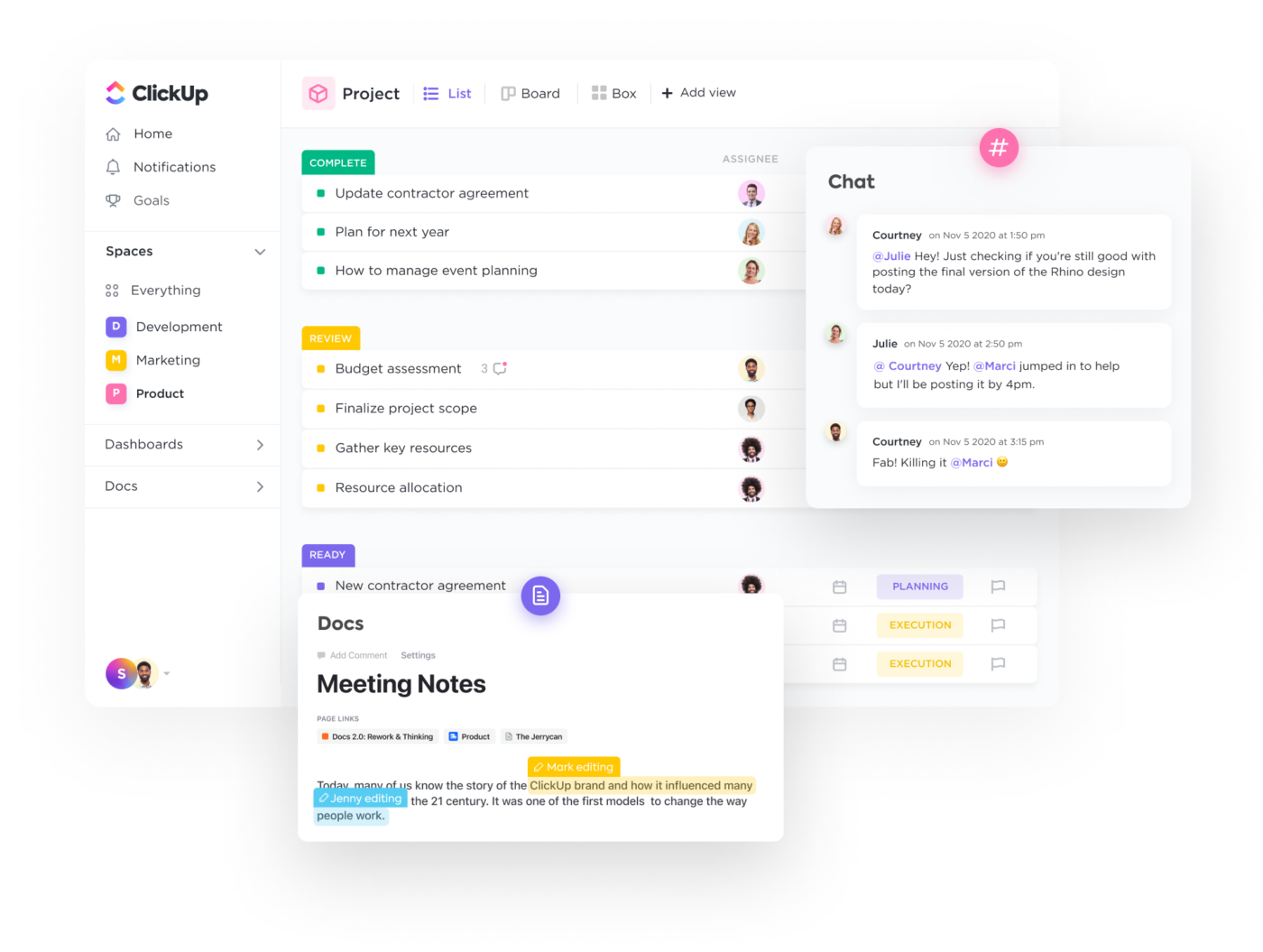
ClickUp is an all-in-one project management tool to help you consolidate your apps, bring teams together in one centralized place, and, most importantly, simplify your workflow so you can operate with efficiency, manage multiple projects with ease, and deliver successful projects on time.
So what exactly makes ClickUp unique and one of the best project management tools available today?
Whether you’re a small business or an enterprise, ClickUp can help you manage your projects more effectively as it can adapt to any business size or type. With its intuitive user interface, customizable workflows, powerful integrations, and flexible pricing, it’s clear why it has become a go-to option for businesses and the perfect project management solution for any team and businesses of all sizes.
Now, let’s take a deep dive deep dive into what makes ClickUp stand out from the competition, how it can benefit your team, and what makes it the top project management choice for your business:
1. All-in-one solution and fully customizable platform
ClickUp is an all-in-one solution, which means you don’t need to use multiple tools to manage your projects and can access all your work in one centralized place.
Access a range of features for task management, time tracking, team collaboration, and even mind mapping and Whiteboards for brainstorming sessions, strategy planning, and more—all in one app. This not only streamlines your workflow but also saves you money and time compared to when using multiple apps.
And as a cherry on top, ClickUp is fully customizable, which lets project managers, stakeholders, and any team across your organization configure ClickUp to fit their needs and preferences without disrupting anyone’s workflow.
2. User-friendly interface and scalability
Whether you’re a tech-savvy individual or not, ClickUp ensures that you can access the tools you need quickly without getting bogged down in complicated features.
ClickUp’s user interface is intuitive and user-friendly, with drag-and-drop functionality and a fully customizable platform, making it easy for anyone on your team to navigate and use effectively.
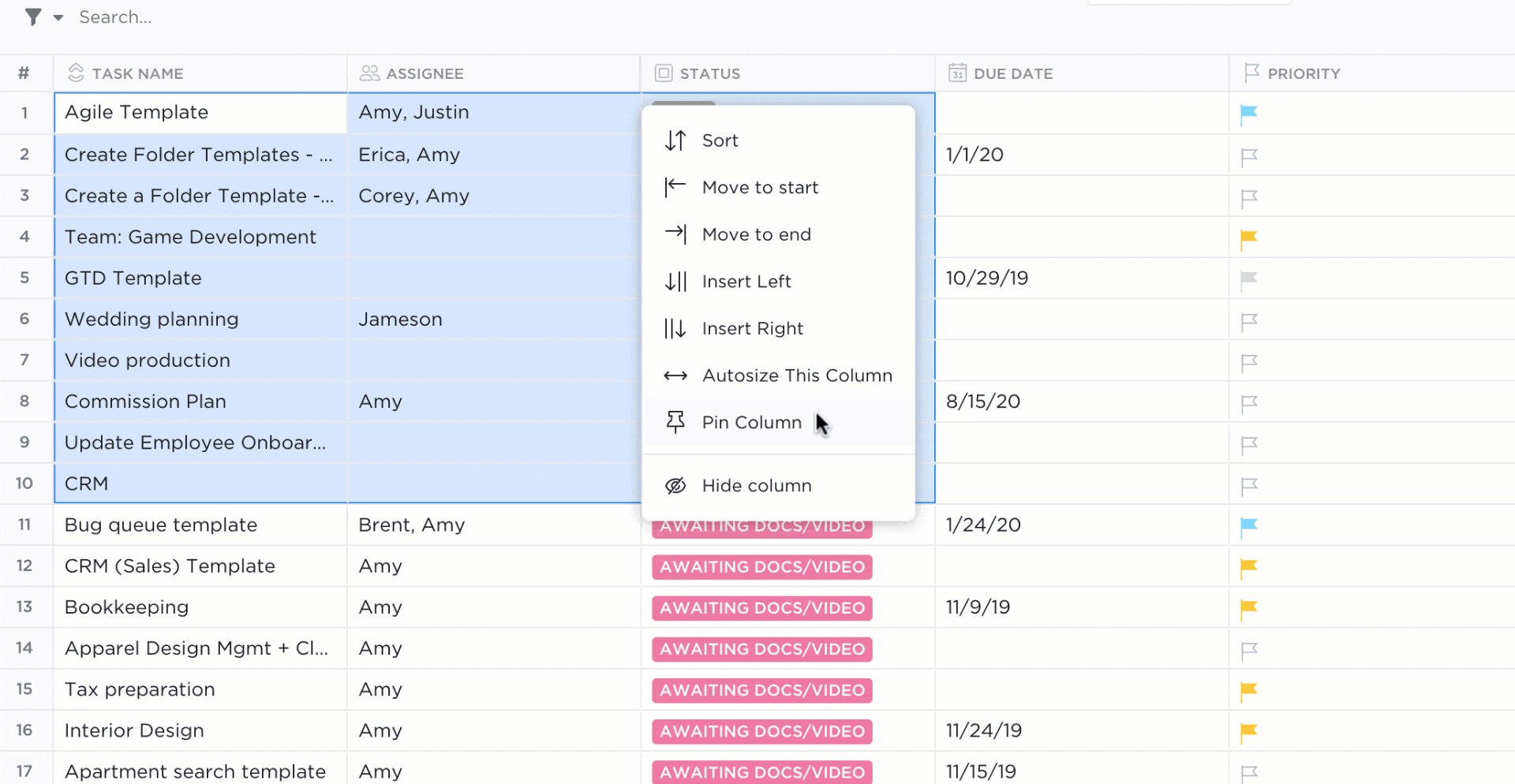
Another compelling advantage of ClickUp is its scalability. It’s suitable for small businesses, mid-market businesses, and enterprises alike, making it an ideal solution for any team size or budget. Plus, it’s straightforward to adjust as your business grows and evolves. You can easily add or remove users, change workflows, and integrate new tools as needed.
3. Customizable workflows and workflow automation
One of the standout features of ClickUp is its customizable workflows enabling you to configure ClickUp to fit your specific needs, preferences, and any project management methodology—a project manager’s dream. ✨
Whether your team follows the agile methodology or uses a more traditional approach, ClickUp lets you set up workflows that work for you.
You can create custom statuses, add Custom Fields, and even automate certain aspects of your workflow. The result is a more streamlined, efficient way of working that saves time and reduces errors.
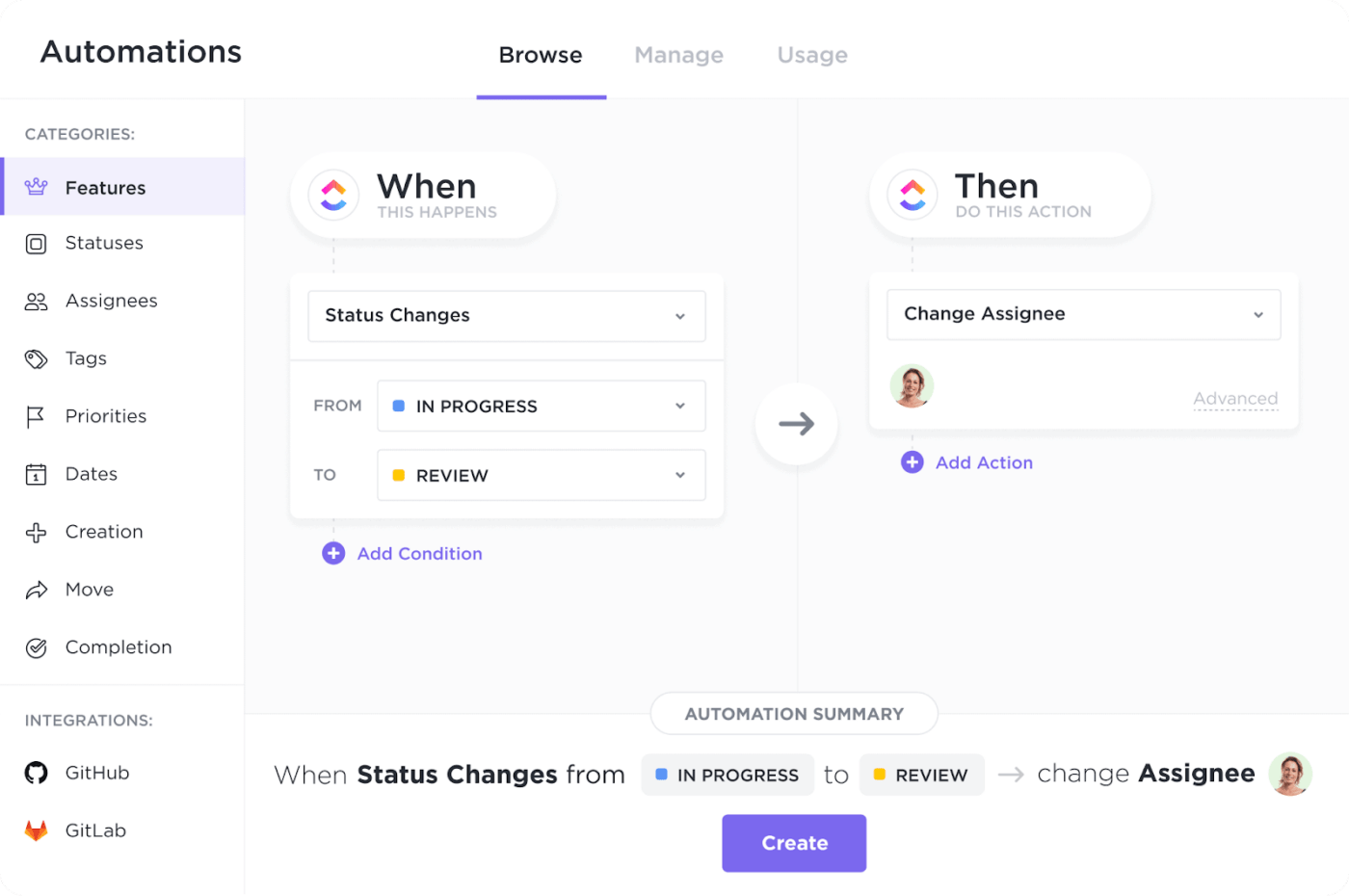
5. Over 15 custom work view options
View your work your way with over 15 custom views to support your project management approach, unique workflows, and personal preferences.
Create the perfect Agile workflow with Board view, manage project timeline, milestones, and more in Gantt chart view, allocate your resources effectively with Workload view, and so much more.

6. Team collaboration
Whether you work with your team in person or remotely, ClickUp’s collaboration features can help you improve team collaboration and stay connected, aligned, and up-to-date at all times.
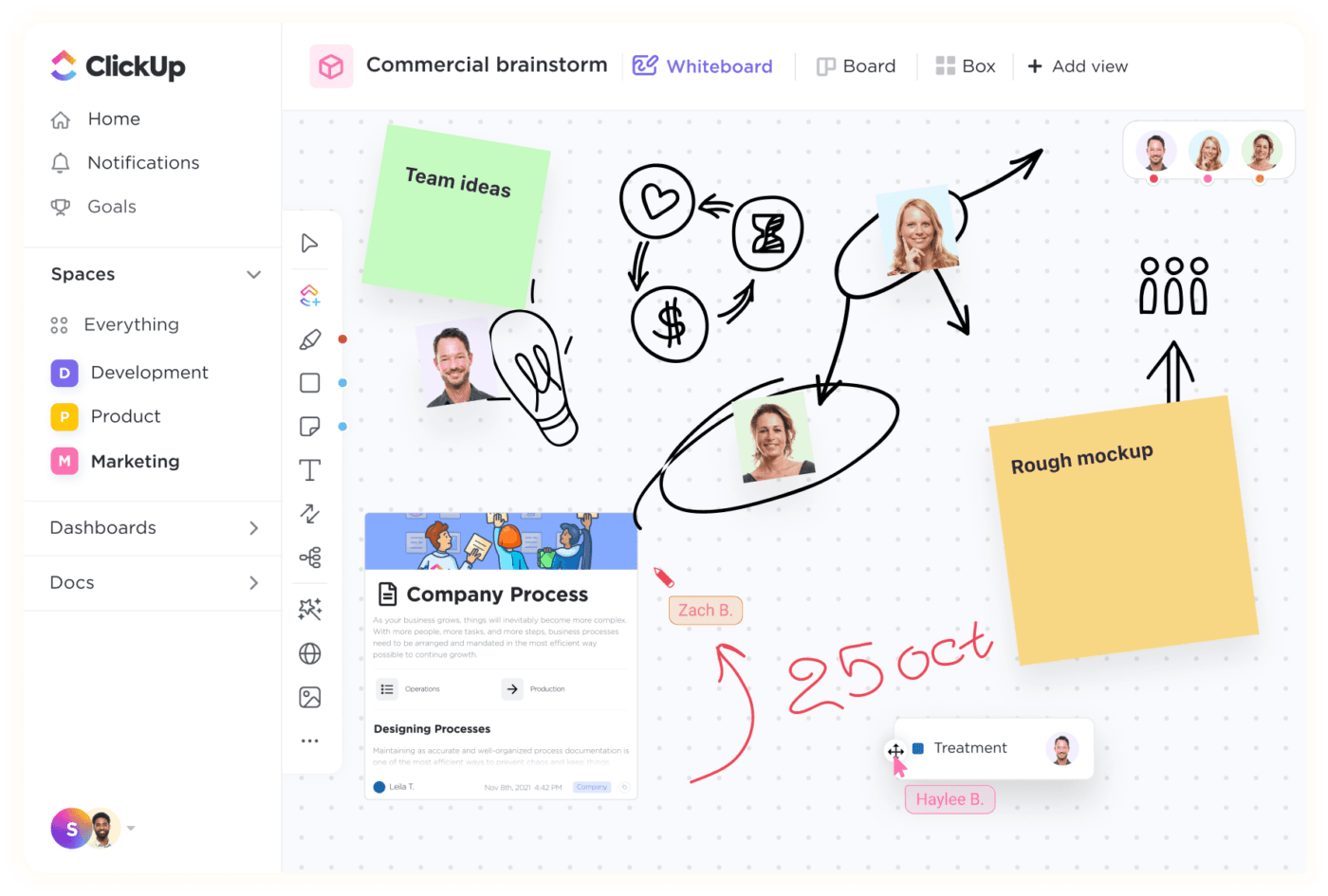
together on a creative canvas with ClickUp Whiteboards
With features such as collaborative Whiteboards for project planning, brainstorming, and strategy sessions, Chat view for instant messaging within ClickUp, assigned comments, multiple assignees, and other collaboration features, your teams will have everything they need to work in real-time or asynchronously.
Additionally, you can use the notifications feed and the task watcher feature to stay in the loop on progress, changes, and other updates in ClickUp.
7. Dashboards with real-time reporting
Project visibility is key to successful project management, which is why ClickUp offers a custom Dashboard that gives you the power to build your own dashboard to give you a high-level overview of your work across your Workspace.
There are unlimited ways you can choose to visualize your work. Simply choose your widgets, such as custom charts, project breakdowns, and more, then drag and drop them into your Dashboard to instantly provide data for any activities or information you want to gather, display, or understand.
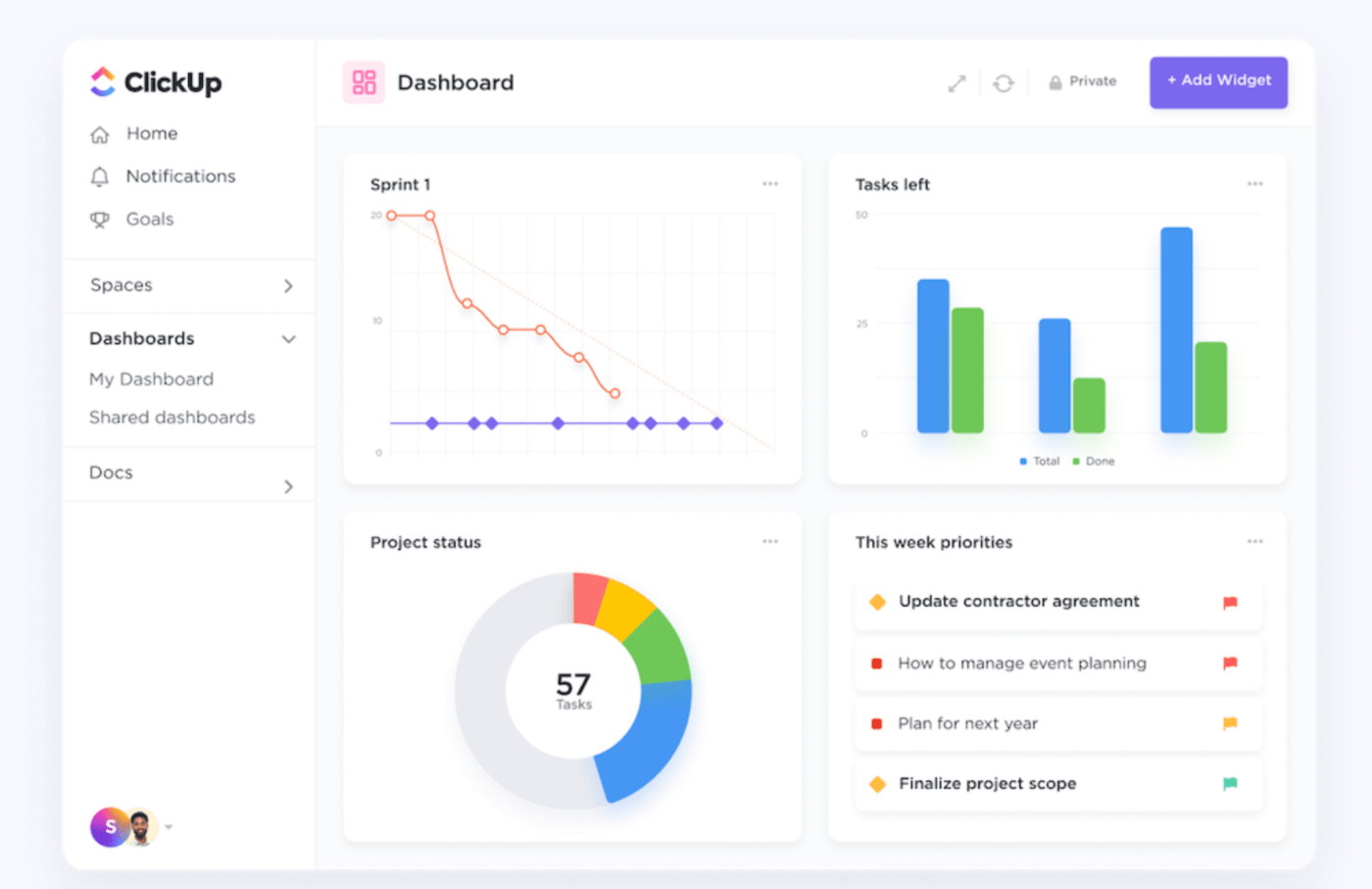
8. ClickUp AI
Work faster, write better, and think bigger with ClickUp AI—ClickUp’s native AI writing assistant. ⚡️
This game-changing and research-based feature ensures high-quality content by using prompts tailored to specific roles. You can also use ClickUp AI for everyday tasks like improving your writing, summarizing lengthy content or notes, creating customer emails, and so much more.
ClickUp AI is available on all paid plans for $5 per Workspace member per month. Use this feature to boost your productivity, write engaging and concise copy, and transform the way you work.
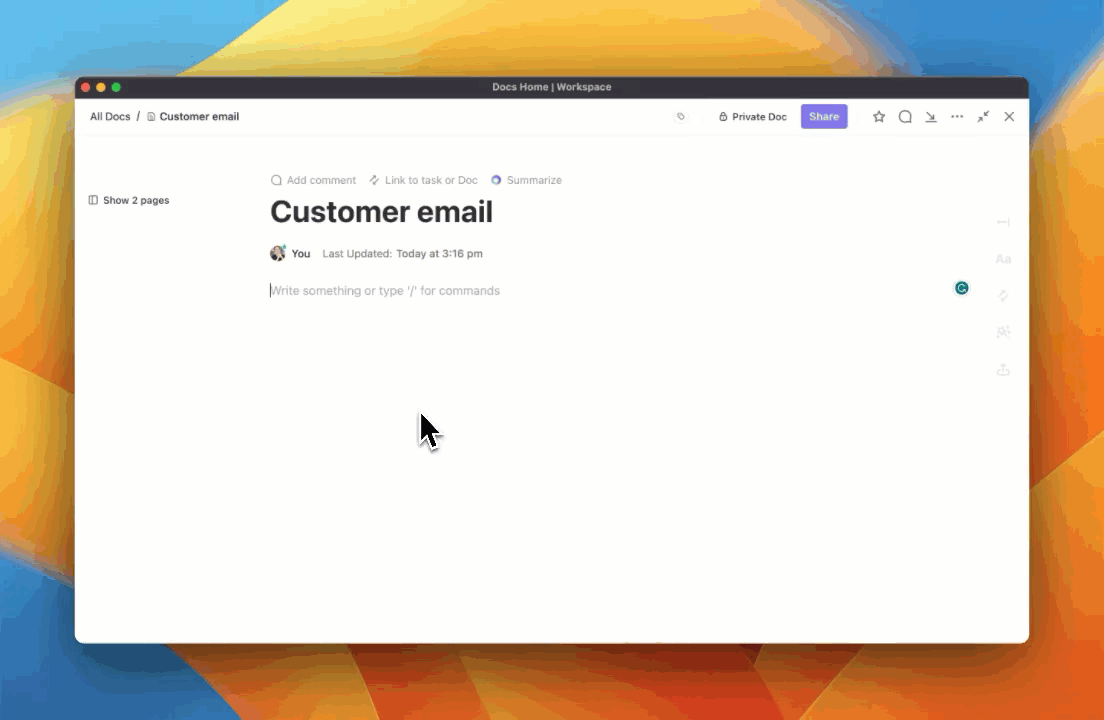
9. Powerful integrations
Integration plays a vital role in streamlining tasks, reducing manual data entry, and automating workflows so businesses can save time, reduce errors, and increase efficiency.
Connect ClickUp to your most-used and favorite work tools; it integrates with over 1,000 work apps, including Slack, Trello, Zapier, and Google Drive, among others.
10. Customizable templates
Don’t know where to start, need inspiration on how to get started on a project, or looking to improve your current processes?
Jumpstart your work with customizable templates for every team and use case. ClickUp offers a library of templates for project management, marketing, engineering, HR, and so much more. Simply add any template to your ClickUp Workspace and customize it to fit your needs.
ClickUp Pros
- A fully customizable platform that caters to every type of team and businesses of all sizes
- Affordable and budget-friendly pricing plans
- Hundreds of customizable features, templates, automation, and more
- Available across all devices, including mobile devices to let you access your work at any time from anywhere
ClickUp Cons
- Learning curve due to the number of available features
- Not all views are available in the mobile app yet
Pricing
- Free Forever Plan: Feature-rich free plan
- Unlimited Plan: $7 per user per month
- Business Plan: $12 per user per month
- Enterprise Plan: Contact ClickUp for custom pricing
Overall, ClickUp is an excellent project management tool that caters to all business sizes. With its powerful task management features, customizable workflows, and project management collaboration tools, ClickUp provides teams with everything they need to manage their projects effectively.
And if you haven’t tried ClickUp yet, we highly recommend you give it a go. It’s free to get started!
2. Wrike
Wrike is an award-winning web-based application for project management. Unlike most project management software on this list, this collaboration tool is especially used in the big leagues. As a result, it’s great for larger teams and huge corporations.
However, like anything meant for the big leagues, it can lose sight of what it means to help the little guys!
Key Features
Here are some of the features that help you hit a home run on all your projects:
A. Three-Pane View
Wrike has a three paned intuitive interface geared towards accessibility and productivity. Here’s what it contains:
- Left pane: contains the project hierarchy to edit and adjust subtasks
- Middle pane: contains all your current task lists for a project
- Right pane: contains detailed information about your tasks
This interface makes it easy to manage everything from one workspace. You can monitor every task dependency, team communication, and project status reports easily.
B. Analytics
Wrike has powerful analytics to give project managers detailed insights about their project and team. Here are two of their most popular analytics reports:
- Global report: Analyzes task data from your projects over eight different categories. It’s useful for expense tracking and calculating future resource management
- Performance chart: Graphical representation of your project’s progress over time
With Wrike, detailed insights are just a click away. It’s visual project management software at it’s finest.
C. Forms and Requests
Overwhelmed with countless email threads and DM (Direct Messaging) notifications?
You don’t have to switch them off; Wrike eliminates the need for them altogether. With their forms and requests feature, you can assign tasks and communicate useful information easily.
Everything you need to know is on the form itself. You won’t need any other follow-ups.
Wrike Pros
- Tons of in-built features such as time-tracking and quick file sharing
- Detailed reports and insights to calculate deliverables
Wrike Cons
- Mobile apps lack functionality
- Not user-friendly, especially for beginners
Bonus: Learn about project management with Wrike.
Pricing
Wrike has multiple variants to choose from.
- Free version
- Team: $9.80 per user per month
- Business: $24.80 per user per month
- Enterprise: Contact Wrike for details
- Pinnacle: Contact Wrike for details
Note: If you have a marketing or creative team, Wrike offers a special creative agencies plan with additional features like a tailor-made workspace and digital asset management tool (price on request).
Customer Ratings
- G2: 4.2/5 (3,200+ reviews)
- Capterra: 4.3/5 (2,300+ reviews)
Missing Features
- Cannot add multiple assignees
- No independent note-taking feature
- Gantt charts are a paid feature
Visit Wrike
3. Asana
Despite its laid-back yoga-inspired name, Asana is a dynamic project management tool used by companies all over the globe. However, it does have a few quirks that could stress you out – making you want that quick yoga session!
Check out our list of top Asana alternatives to help you breathe easy.
Key Features
Here are a few features of this project management tool that give project managers peace of mind:
A. User Interface
One of the best things about Asana is its intuitive user interface. It’s simple and easy to use.
You get tons of flexibility (pun intended) over how it looks and can move your task list around very easily. You also have access to an activity feed on your dashboard to keep up with what your team members are up to.
This makes it a great project management solution for simple projects.
B. Visual Project Timeline
Asana’s visual project timeline feature is a Gantt chart of sorts. It highlights your task due dates, assignees, and progress over time. However, if you’re looking for a true Gantt chart, you’ll need separate Gantt chart software.
You can get a detailed view of your project with this visual project timeline and can make scheduling adjustments easily.
C. Loads of Integrations
Asana can become one with everything, literally.
Asana can integrate with loads of applications to become a hub for all your business activities. Here are some popular apps it can integrate with:
- Slack: for quick team communication
- Outplanr: to track time and to-do lists
- Google Calendar: to manage your activity schedules
- Dropbox: for easy file sharing
- Unito: integrate with other team collaboration tools like Basecamp, Wrike, and Trello
Asana Pros
- Project timelines for simple workflow management
- Tons of helpful integrations
- Drag and drop functionality for task management
Asana Cons
- Limited features on the free version
- Not ideal for complex projects with multiple workflows
- No visual collaboration features such as mind maps in its project management platform
- No multiple assignees feature, so team workspaces are cluttered with task copies
Pricing
- Basic: Free version
- Premium: $10.99 per user per month, billed annually
- Business: $24.99 per user per month, billed annually
- Enterprise: Contact Asana for details
User Ratings
- G2: 4.3/5 (9,200+ reviews)
- Capterra: 4.5/5 (11,900+ reviews)
Missing Features
- Cannot assign work through comments to team members
- Cannot add multiple assignees to a task
- Cannot switch between views on the same project
- No custom statuses
- No “Me” tab to only view tasks that concern you
- Does not support native mind mapping
- No built-in wiki tool
Visit Asana
4. Trello
In comparison with the previous tool, Asana, Trello is a simple project management tool. Known for its iconic cards, Trello works like supercharged sticky notes.
And just like sticky notes, they’re great to look at and handy in a pinch, but if you’re looking for something more comprehensive, you might want to look elsewhere.
Key Features
Here’s a closer look at its features:
A. Simple Task Management tool
Trello assigns a “Board” to each task. A project manager can access these boards from their dashboard and make any changes they want. They can add tags, custom fields, and priorities, all with one click.
B. Drag and Drop Functionality
Trello lets you drag and drop tasks around your dashboard. This makes rescheduling and editing tasks and projects easy.
It’s Kanban project management at it’s finest. Uncomplicated and effective.
C. Power-Ups
Each project task can be assigned a power-up depending on what’s needed. Most of these power-ups are free and have paid upgrades for more functionality (similar to most freemium games.)
Some of these power-ups include features like calendar views, Google Drive integrations, and quick file sharing.
Trello’s most popular power-up is its “Butler” feature that lets it automate a preset group of tasks.
Trello Pros
- Simple and user friendly interface
- Easy task management and scheduling
- Useful power-ups for additional functionality
Trello Cons
- No views other than Kanban views
- No reporting features
- Cannot manage complicated projects
- Relies on external integrations for functionality
- No advanced features like native Mind maps, Docs, and Gantt charts
Check out these Trello alternatives!
Pricing
- Free version
- Standard: $5 per user per month
- Premium: $10 per user per month
- Enterprise: Starting at $17.50 per user per month and up
Customer Ratings
- G2: 4.4/5 (13,000+ reviews)
- Capterra: 4.5/5 (22,300+ reviews)
Missing Features
- Relies on external integrations for advanced functionality
- Cannot add multiple assignees to a project
- No in-built wiki capabilities
- Cannot assign comments to team members
- No native spreadsheets
- Cannot export projects on the free plan
Visit Trello
5. Workzone
Workzone is a tried and tested web-based software that’s been around since 2000. But that doesn’t mean it’s as dead as a dinosaur. Sure, it’s not the best project planner on this list, but I guess everyone needs a throwback now and then.
Key Features
Here’s why this project management tool is alive and kicking in 2021:
A. Simple Project Management
Since Workzone is old-school, it offers no-nonsense project management.
All your projects are accessible from your project dashboard, where you can easily check their status. Open any project, and you’ll instantly see subtasks, due dates, and the assignees involved.
You’ll also get helpful notifications whenever deadlines are approaching to stay on top of everything.
Workzone is all about functionality, with none of the fluff.
B. Smooth Team Collaboration
Workzone lets your project team members collaborate easily via the comment section present under every task.
This ensures that all your conversations are neatly ordered and are situated where they’re most relevant.
C. Reporting Capabilities
Workzone gives you detailed reports over a variety of topics. You get:
- Reports on individual performances
- Progress statuses for your projects
- Time management reports
You can customize each report too. You can view them as a classic bar chart, a pie chart, or as a table. This gives you the information you need in the way you want it.
Workzone Pros
- Straightforward project management
- Powerful to-do lists
- Good reporting capabilities
Workzone Cons
- Mobile applications need work
- Lacks features like assigned comments and multiple views
- User interface is dated
Pricing
Workzone offers you three variants.
- Team ($24/month per user): For loads of features and 100GB of cloud storage for uploads
- Professional ($34/month per user): For all the “Team” features + 150GB of cloud storage for uploads
Customer Ratings
G2Crowd: 4.3/5 (40+ reviews)
Capterra: 4.7/5 (120+ reviews)
Missing Features
- No free version
- No board or box view available
- Cannot assign comments to team members
- Cannot add threaded comments to workspaces
Visit Workzone
6. ProofHub
ProofHub is another big name in the world of project management. True to its name, it’s a great online proofing tool…but that comes at the expense of it falling short of being the best project tracker out there.
Key Features
Here are the features that make this web-based software a powerful tool:
A. User Interface
ProofHub’s interface isn’t rocket science. You can organize tasks, teams, and projects from your dashboard with ease. ProofHub also lets you set status alerts with the click of a button, making it easy to manage projects.
B. Customization
ProofHub gives you tons of customization options to suit your needs. You have complete control over the color scheme of your tool as well as the layout. You can also white-label it by adding your company name and logo everywhere…just don’t go too crazy with it.
It also offers multilanguage support for French, German, and Spanish.
C. Access Rights
ProofHub lets project managers assign custom roles to employees. These custom roles give employees varying access to your tool. This is a good way to ensure that only certain people can access sensitive projects and useful information.
ProofHub Pros
- Loads of customizability
- Good security features like custom access rights
- Powerful mobile applications for iOS and Android
ProofHub Cons
- Lacks additional functionality such as budgeting templates
- Not meant for complex project management
- Reputation for bugginess
Pricing
ProofHub gives you two variants
- Essential Version ($45/month, billed annually): for 40 projects + 15GB of cloud storage space + unlimited number of users
- Ultimate Control Version ($89/month, billed annually): for loads of additional features + unlimited number of projects + 100GB of cloud storage + unlimited users
Customer Ratings
G2Crowd: 4.4/5 (30+ reviews)
Capterra: 4.3/5 (40+ reviews)
Missing Features
- No free plan
- Cannot add custom fields
- Does not support tagging people in comments
Visit Proofhub
7. MeisterTask
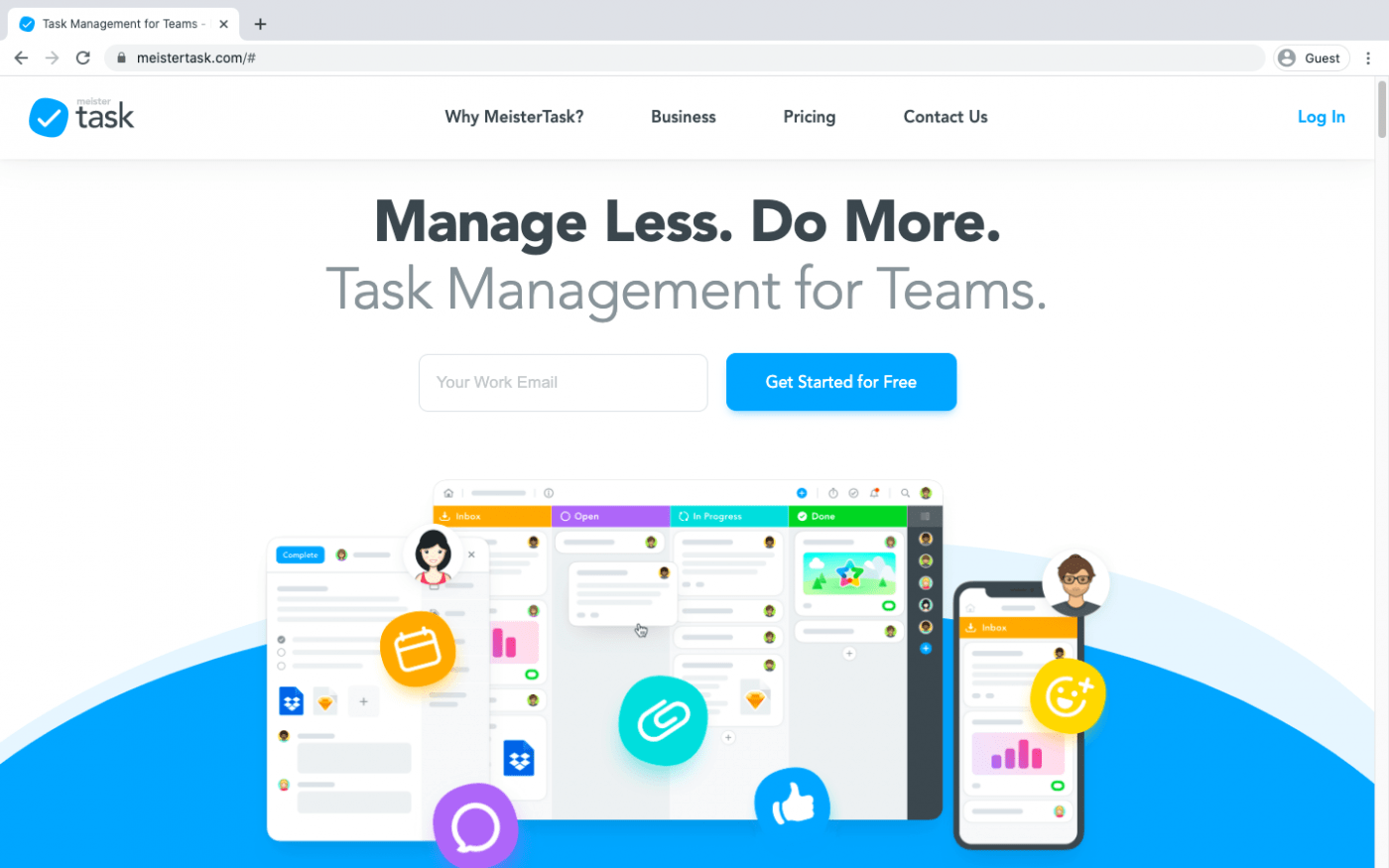
MeisterTask is another Kanban-based project management tool that’s really popular. Unlike Trello, it’s great Agile project management. However, like Trello, there are more comprehensive solutions out there.
Key Features
Here are some of its key features:
A. User-Friendliness
As it’s a Kanban tool, MeisterTask is very user friendly. It’s very simple to use, and the layout is extremely attractive.
Each project is listed as a card on your dashboard that can easily be accessed and moved around. Each card also has an in-built timer to show you how much time you have before it’s deadlines arrive.
B. Good Collaboration Software
MeisterTask is a good project management collaboration software for your team. Each user has a central place to share files and ideas with the rest of the team. There’s also an activity stream for sharing deadlines, updates, and assignments.
C. Customizability
MeisterTask lets you customize your dashboards to suit your needs. You can change the theme and switch projects around by dragging and dropping them to different places.
Each project can also be customized with features like video thumbnails. This ensures that you’re not stuck with the same rigid interface for each project!
MeisterTask Pros
- Loads of customizability
- Team members will find it easy to collaborate over a project proposal
- Loads of integrations with tools like Slack and GitHub
MeisterTask Cons
- Can’t handle complex projects
- Mobile tools lack functionality
Pricing
MeisterTask offers you four different versions.
- A free variant: for unlimited users + projects
- A Pro variant ($4.19/month per user, billed annually): for unlimited users + projects + additional features + unlimited integrations
- A Business variant ($10.39/month per user, billed annually): for unlimited users + projects + additional security + priority customer support + security features
Customer Ratings
G2Crowd – 4.4/5 (150+ reviews)
Capterra – 4.7/5 (850+ reviews)
Missing Features
- Cannot support a box or list view, only supports a Kanban interface
- No Gantt chart tool for a bird’s eye view of your project progress
- Cannot customize statuses
Visit Meistertask
8. Monday.com
Formerly known as dapulse, Monday.com is another good online project management solution available today. However, it is named after everyone’s least favorite day of the week. Is that a sign of things to come? Let’s find out:
Key Features
Here’s what makes Monday.com special:
A. Third-Party Collaboration
Most project management tools only allow team members to access their workspaces. This makes working with freelancers and third-party agents difficult.
Not for Monday.com, though.
A team leader can add as many third-party agents as they want.
You can customize their access rights to ensure that they only access projects assigned to them.
Compare Monday.com to ClickUp!
B. Easy Communication
Monday.com is a good project management collaboration software because of its comment sections. Teams can use it to share ideas, project tasks, and files with no difficulty.
Monday.com also lets you follow Twitter and Linkedin threads in the app to stay updated.
C. Loads of Native Integrations
Monday.com can integrate with tons of integrations such as Google Drive, Dropbox Paper, and Zapier to boost its functionality.
As Monday.com is built on an open-source framework, developers can add their own custom integrations as well.
Monday.com Pros
- Open API architecture allows you to add custom integrations
- Detailed reporting capabilities
- Ability to add freelancers and third-party agents
Monday.com Cons
- Cannot handle complex projects
- No free plan
- Mobile apps need work
Pricing
Monday.com has four plans:
- Basic plan ($8/month per user): Includes unlimited free viewers + mobile apps+ 5 GB data storage
- Standard ($10/month per user): Includes project timeline view + 5 native integrations + 50 GB data storage
- Pro ($16/month per user): Includes time tracking + chart view + 100 GB data storage
Customer Ratings
G2Crowd: 4.7/5 (7,550+ reviews)
Capterra: 4.6/5 (3,700+ reviews)
Missing Features
- No free plan
- Cannot toggle between views in the same project
- Cannot set up recurring tasks
- Does not support automatic time tracking
- No mind mapping capabilities
- Cannot assign comments
- Cannot monitor task dependencies
Visit Monday.com
9. Teamwork
Teamwork is a great online project management tool, which helps you with… team work (was that a little too obvious?)
Key Features
Here’s a closer look at its features:
A. Intuitive Dashboard
Teamwork’s dashboard is unique as it gives you an option to only see your most recent tasks. This way, you’ll never get lost in an ocean of completed tasks. While dealing with loads of projects, this key feature can be useful to identify priority targets and deal with them first.
The dashboard’s interface can also be customized to include your company’s name and logo.
B. Email Integration
Teamwork lets you reply to comments and notifications via email. This makes responding super convenient, and you can get things sorted out in seconds.
You can add multiple email accounts and signatures to further customize this process.
C. Invoicing Capabilities
Teamwork’s time tracker has an invoicing tab that can be a useful billing feature. It can calculate billable hours in order to generate invoices for your clients.
As the invoices are directly generated from your timesheets, so your clients know that you’re billing them correctly.
Teamwork Pros
- Loads of customizability
- Lots of native features such as an invoicing tool for clients using built in timesheets
- Good mobile applications
Teamwork Cons
- Cannot handle complex project management
- Free plan only useful for very small teams working on two or fewer projects
Pricing
There are four Teamwork variants available.
- Free: Up to five users working on a maximum of two projects
- Pro ($12.50/month per user): Workload view + 300 projects a month
- Premium ($22.50/month per user): 50 project templates + 600 projects a month
- Enterprise (price varies): Single sign-on, priority support
Check out these Teamwork alternatives!
Customer Ratings
G2Crowd: 4.4/5 (1000+ reviews)
Capterra: 4.5/5 (800+ reviews)
Missing Features
- Lack of Goals feature
- Very limited reporting
- Cannot add tasks to multiple lists
Visit Teamwork
10. Podio
Citrix Podio is a good project management tool with tons of app integrations. Just like a chameleon, this project tool is famous for its adaptability and customizability. However, it does run the risk of being a jack-of-all-trades and a master-of-none.
Key Features
Here’s a closer look at every key feature it has to offer:
A. App Market
Podio’s claim to fame is its app market. You’ve got hundreds of web-based software add-ons that can add functionality to your app.
You have…
- Expense tracking apps
- Organization apps
- Notes apps
- Templates
- Invoicing tools
- And several more.
B. Simple Interface
Podio opts for a simple and user friendly interface that’s easy to operate. Your dashboard shows you your current projects, activity stream, and calendar. It’s everything you need, stored in a single place.
This makes workflow management smoother than cream cheese spread on a bagel.
Podio’s interface can also support over 12 languages to make sure everyone’s comfortable using it.
C. Custom API
Podio is almost an open-source tool. Your developers can use the Podio API to add as many custom integrations as they want.
Podio Pros
- User friendly interface
- Loads of add-ons in the app store
- Can handle custom integrations
Podio Cons
- Lacks in-house functionality such as assigned comments and reports
- Cannot handle complex project management
Pricing
There are four Podio versions available:
- Free Plan: with basic project planning and access to the app store
- Basic Plan ($9/month): with project planning + unlimited number of projects and users
- Plus Plan ($14/month): with advanced project planning + automated management of your workflow
- Premium Plan($24/month): with visual reports and interactive dashboards
Customer Ratings
G2Crowd: 4.2/5 (330+ reviews)
Capterra: 4.3/5 (250+ reviews)
Missing Features
- Cannot customize access rights
- No Gantt chart tool to manage your projects task dependencies
- Cannot switch between views in a project
- Cannot add custom statuses
- Cannot add multiple assignees
Visit Podio
6 Steps to Choose the Best Project Management Tool
As mentioned in the beginning, it’s hard to get started. Here are the six steps that you can follow to decide on the best project management tool.
1. Define Your Needs
First, you need to identify current problems in your current workflow.
It’s also important to consider the company as a whole, as the best project management tool should be cross-functional in order to scale up into the organization. After all, it would be a headache to collaborate with different departments all using completely different project management software.
With this in mind, you need to consider the company culture and the project management methodology adopted by your organization. You want your project management tool to fit seamlessly into this organizational fabric.
2. Put together an Evaluation Team
When you move forward to this stage, it’s important to organize a team that can represent several organizational functions for best effect.
For example, the sales team would use the project management software tool in a completely different way from the marketing team. Additionally, managers may be interested in higher-level overviews while specialists need to be able to navigate through granular pieces of a project. Great project management tools need to have this flexibility.
Then, you need to create standards of evaluation. It’s difficult to judge a tool’s effectiveness if everyone’s vocabulary to give feedback differs. Lastly, compile a list of top tools contending for your business. Our top 10 list would be a great starting point.
3. Test the Tool
After settling on which project management tool or tools to test, it’s now time to test.
Commit to a timeframe in which you will use the tool to its fullest capacity. This is the time to pilot a project and see if the project management tool will address your needs in step 1.
Learn the tool by reading help docs, watching webinars, or contacting customer service as well as getting a demo from the sales team. For example, ClickUp has 24/7 customer chat and email support as well as coaches and support staff on standby to demo the platform.
4. Get Management Buy-in
After a successful pilot, it’s time to convince your boss to switch to this project management tool. When addressing the executive team, it’s important to keep these things in mind
- What potential objections will management have that I can address?
- What management pain points does this tool help solve?
- Do we have data to prove the effectiveness of the project management solution?
5. Purchase and Implement the Tool
Congratulations! Management has approved the use of this project management tool. However, your job as a project manager is not over yet. First, commit to a timeline and a plan. When do you want to bring everyone on?
To maximize the impact of this project management tool, how much training will your team members need and who will give it? For example, ClickUp offers professional services to help teams transition into using the platform.
Do you have current software that need to be integrated into the project management workflow?
6. Review and Iterate
After implementation, you should review the impact this tool has had on your organization. Did it truly address the needs you set out to fulfill in step 1?
Get feedback from your team after everyone is past the learning curve. Does anything need improvement?
Additionally, the project management tool may have features that you were previously unaware. Continue to work with client success and attend training workshops that might be relevant for your workflows to further integrate the tool into your organization.
Related: Project Management Software for Mac
Features to Look for in Project Management Tools?
1. Team Collaboration
How can you predict your project’s success?
Hint: A magic 8 ball, tarot cards, or an ouija board can’t help you. (And even if they did, the reply wouldn’t be so comforting.)
So how do you do it?
You just need to know how well your team works together.
Team collaboration essentially determines whether your projects meet deadlines or not. Effective teamwork is the core of every project management process: Agile or otherwise.
Good project management software lets your team communicate easily and effectively. They need to easily share ideas, opinions, resources, or even attach files to get work done quickly.
What would happen if your project management software doesn’t have any team collaboration features?
2. Innovative Features
Project management is a dynamic process. New process innovations and breakthroughs happen all the time.
But is your project management system keeping up with times, or is it way past its prime?
You should choose a project management app that regularly keeps rolling out cool features. These could be things like an integrated wiki feature, a notes app, a built-in Gantt chart, and the list goes on.
If not, you’ll be stuck with a Stone Age tool while everyone else would be equipped with lightsabers.
3. Customizability
Every company is different. Every workforce is different. Every project has different challenges.
Your project management app must adapt to this reality. It needs to be customizable. You should have customizability over layouts, themes, views, project milestones, and everything.
Your project management tool must be flexible enough for managing entire enterprises or a specific task within an employee’s day-to-day. After all, you should be running the show, right? Not your project management app!
4. User-Friendliness
If your tool isn’t easy to use, it just isn’t worth it.
It could have a million different features, but if they’re not user friendly, what’s the point?
Your team will waste precious work hours figuring how to use it. Imagine that: wasting time on a productivity tool. How ironic is that?
You might as well stick with Microsoft Word to manage projects!
5. Customer-Focused Product Roadmap
Great project management software always let you know what’s in store for its future.
There has to be a set of ideas and objectives that it’s planned to release in the upcoming months. If there’s no project roadmap, there are two possibilities:
- These project management apps aren’t looking to achieve much
- or the software development team has given up on it
Moreover, this roadmap should be based on what the users want. So go for a tool that keeps customer inputs and feedback at the very core of its innovation and product roadmap.
For example: a free project management software like ClickUp has a public roadmap and also allows users to vote for the feature they’ll like to see next.
So choose the best project management software tool that challenges itself to be better and push the boundaries of what’s expected.
It’s what you expect from your entire team, right?
Why not hold your software to the same standard?
Project management tools FAQs
Still unsure about a few things in project management tools?
We got you covered.
Here are some of the answers to your burning questions:
1. How much do project management tools cost?
Upgrading to high-quality project management software can revolutionize the way teams and businesses operate, offering enhanced efficiency, heightened productivity, and superior project outcomes.
Whether you opt for affordable options like Trello or Asana’s basic plans, or invest in pricier packages like Jira, project management software prices vary from a few hundred to several thousand dollars per year.

However, the pricing model (subscription-based, freemium, perpetual license, pay-as-you-go, and custom pricing) is only one consideration of the purchasing process.
Selecting project management software is crucial for organizations embarking on growth and expansion, as it enables the transformation of project data. In various industries, teams are embracing a skills-based hiring approach, reshaping how individuals work and collaborate to achieve business objectives and priorities.
2. What are the four main types of project management tools?
There are several types of project management software available, but here are the four main types:
- Desktop-based project management software is installed onto a desktop and is only accessible from the same computer
- Cloud-based project management software makes it easy to connect with work and teams on the go as long as the device has an internet connection
- Open-source project management software is free to use and backed by a wide range of creators and users that keep it functioning and up-to-date
- Integrated project management software combines multiple tools and features to manage projects under one platform
3. What types of tools are used in project management?
There are tons of charts, diagrams, reports, and documents that help with planning and executing successful projects.
All of these important elements are also known collectively as ‘project management tools.’
Let’s take a look at a few of them:
- Work Breakdown Structure: visualizes project scope by breaking down the project into smaller components
- Mind maps: helps brainstorm project ideas and tasks
- Gantt charts: see the project overview in a glance with this horizontal bar chart
- Calendar: used to track and manage the project schedule
- Network diagram: visualizes all the tasks, responsibilities, and project workflows
4. What Is The Best Project Management Tool?
ClickUp is the best project management tool available today. While most project management tools have a few features to offer, ClickUp has everything an on-premise, remote team, or an Agile team needs to plan and track successful projects.
Get Organized with Project Management Tools
Finding the best project management isn’t easy, especially when you’ve got tons of great options.
While all these tools are great, ClickUp is the best free project management software in 2021. Even its free version has more functionality than the paid versions of most other tools.
It’s like getting a pair of new Air Jordans…for free!
Sign up for ClickUp today!


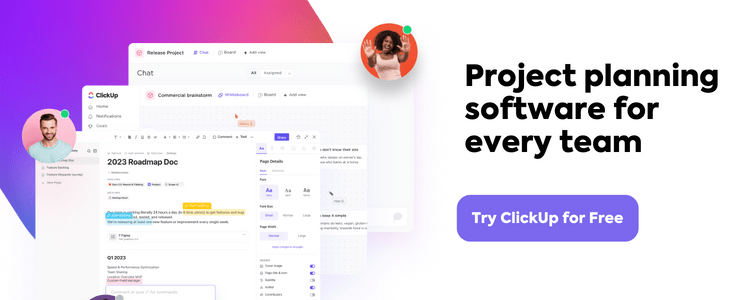
Questions? Comments? Visit our Help Center for support.